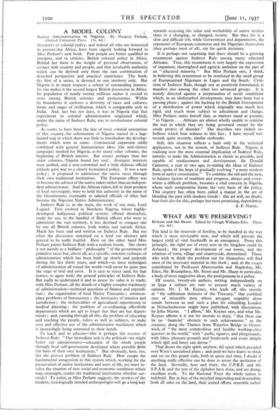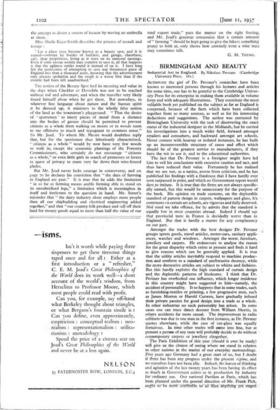WHAT ARE WE . PRESERVING?
THE land is the reservoir of fertility, to be handled in the way which is most serviceable now, and which will provide the largest yield of vital foodstuffs in an emergency. From this principle, the right use of every acre in the kingdom could be deduced ; the proper development of our towns, and the relations of town, village and countryside, determined. Those who wish to think the problem out for themselves will find .., most of the necessary material in this book ; and, in the essays ' contributed by Professors Abercrombie and Stapledon, Mr.
Eden, Mr. Boumphrey, Mr. Street and Mr. Sharp in particular, a body of most suggestive ideas, the prolegomena. to a policy.
Of course, twenty-six authors, writing independently on so large a subject are sure to present much variety of opinion. Mr. J. M. Keynes, who leads off, tilts merrily at "the subhuman denizens of the Treasury," that purblind race of miserable men whose arrogant stupidity alone stands between Us, and such a plan for rebuilding London as Nebuchadnezzar might- have published,- with illustrations by John Martin. "I affirm," Mr. Keynes says, and what Mr. Keynes affirms it is not for mortals to deny, "that there can be no ' financial ' obstacle to such achievements" as the creation, along . the Thames from Waterloo Bridge to Green- wich, of " the most commodious and healthy working-class quarters in the world," with "parks, squares, and playgrounds, with lakes, pleasure-grounds and boulevards and every delight _which skill and fancy can devise." Thaahows the right spirit, anyhow, the spirit which presided over Wren's unrealised plans ; and until we have learnt to think and see on this grand scale, both in space and time, I doubt if anything really effective can be done to arrest the spoliation of the land. Severally, here and there, the C.P.R.E. and the S.P.A.B. and the rest of the alphabet have done, and are doing, excellent work. To the National Trust the whole nation is indebted. But in face of the mischief impending and descending iroin all sides on the land, their 'united efforts resemble rather
the attempt to divert a swarm of locusts by waving an umbrella at them.
Miss Sheila Kaye-Smith describes the process of assault and ravage :
"Let a place once become known as a beauty spot, and it is ruined—overrun by hordes of builders, and garage, charabanc, caf, shop proprietors, living as it were on its immoral earnings. Even if some rescue society may contrive to save it, all that happens is that the ugliness settles round it instead of on it. I have long felt the uselessness of attempting to save any threatened piece of England less than a thousand acres, knowing that the advertisement only attracts spoliation and the result is a worse blot than if the trouble had been left unadvertised."
The notion of the Beauty Spot had its meaning and value in the days when Cheddar or Dovedale was not to be reached
without toil and adventure, and when the traveller very likely found himself alone when he got there. But nowadays, in whatever fine language about nature and the human spirit
it be dressed up, it ministers to the wholly false notion of the land as the townsman's playground. "That the desire of ' sportsmen ' to insert pieces of metal- from a distance into the bodies of grouse should be permitted to prevent
citizens as a whole from walking on moors or in woods seem to me offensive to much and repugnant to common sense." So Mr. Joad. To whom Mr. Moore would doubtless reply that, but for the sportsmen thus laboriously characterised, "citizens as a whole" would by now have very few woods to walk in, except the economic plantings of the Forestry Commissioners, who certainly do not encourage "citizens- as a whole," or esti: little girls in search of primroses or lovers in quest of privacy to roam very far down their wire-fenced glades.
But Mr. Joad . never lacks courage in controversy, and on page 70 he declares his conviction that "the. days of farming in England are past." It is true that he adds the limitation "in so far as farming means arable farming able to stand on its unsubsidised legs," a limitation which is meaningless in itself and irrelevant to the question in hand. Mr. Street's rejoinder that "the dairy industry alone employs more people than all our shipbuilding and electrical engineering added together," and that "our country. folk produce and sell off their land for money goods equal to more than half the value of our
total export trade," puts the matter on the right footing, and Mr. Joad's gracious concession that a certain amount of" farming "should be kept going to give the hikers something pretti to look at,. only shows- liOw unwisely Z.Ven-a *fie Min may sometimes talk.
G. M. YOUNG.

























































 Previous page
Previous page